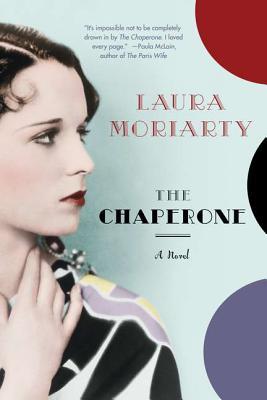Goodreads.com Description: The Chaperone is a captivating novel about the woman who chaperoned an irreverent Louise Brooks to New York City in 1922 and the summer that would change them both.
Only a few years before becoming a famous silent-film star and an icon of her generation, a fifteen-year-old Louise Brooks leaves Wichita, Kansas, to study with the prestigious Denishawn School of Dancing in New York. Much to her annoyance, she is accompanied by a thirty-six-year-old chaperone, who is neither mother nor friend. Cora Carlisle, a complicated but traditional woman with her own reasons for making the trip, has no idea what she’s in for. Young Louise, already stunningly beautiful and sporting her famous black bob with blunt bangs, is known for her arrogance and her lack of respect for convention. Ultimately, the five weeks they spend together will transform their lives forever.
For Cora, the city holds the promise of discovery that might answer the question at the core of her being, and even as she does her best to watch over Louise in this strange and bustling place she embarks on a mission of her own. And while what she finds isn’t what she anticipated, she is liberated in a way she could not have imagined. Over the course of Cora’s relationship with Louise, her eyes are opened to the promise of the twentieth century and a new understanding of the possibilities for being fully alive.
Drawing on the rich history of the 1920s,’30s, and beyond—from the orphan trains to Prohibition, flappers, and the onset of the Great Depression to the burgeoning movement for equal rights and new opportunities for women—Laura Moriarty’s The Chaperone illustrates how rapidly everything, from fashion and hemlines to values and attitudes, was changing at this time and what a vast difference it all made for Louise Brooks, Cora Carlisle, and others like them.
Only a few years before becoming a famous silent-film star and an icon of her generation, a fifteen-year-old Louise Brooks leaves Wichita, Kansas, to study with the prestigious Denishawn School of Dancing in New York. Much to her annoyance, she is accompanied by a thirty-six-year-old chaperone, who is neither mother nor friend. Cora Carlisle, a complicated but traditional woman with her own reasons for making the trip, has no idea what she’s in for. Young Louise, already stunningly beautiful and sporting her famous black bob with blunt bangs, is known for her arrogance and her lack of respect for convention. Ultimately, the five weeks they spend together will transform their lives forever.
For Cora, the city holds the promise of discovery that might answer the question at the core of her being, and even as she does her best to watch over Louise in this strange and bustling place she embarks on a mission of her own. And while what she finds isn’t what she anticipated, she is liberated in a way she could not have imagined. Over the course of Cora’s relationship with Louise, her eyes are opened to the promise of the twentieth century and a new understanding of the possibilities for being fully alive.
Drawing on the rich history of the 1920s,’30s, and beyond—from the orphan trains to Prohibition, flappers, and the onset of the Great Depression to the burgeoning movement for equal rights and new opportunities for women—Laura Moriarty’s The Chaperone illustrates how rapidly everything, from fashion and hemlines to values and attitudes, was changing at this time and what a vast difference it all made for Louise Brooks, Cora Carlisle, and others like them.
I really liked this book. It was well written and straight to the point throughout. I didn't enjoy the last fifty pages or so, because they added nothing to the story, and it was a good story. There was so much more the author could have added if there was a page number requirement from the publisher.
I said as much on my review at Goodreads.com. The essence of the story was amazing. The last chapter was not necessary. That being said, lets focus on the good 95% of the story.
The setting: glamour, dancers, New York, theaters. It was everything I liked about the century! With some good ole' drama thrown in.
The characters: A rebellious (and talented) teen, a chaperone with a secret of her own, their respective families. All of them with three-dimensional personalities and as real as myself. I was very impressed with the author's ability to make me think about the characters and feel for their faults and successes.
The story: riveting and (kudos to the author) unpredictable. It was heartfelt and sincere, without stepping into 'mushy' territory. It was special. It will have a place in my heart forever.
Why only 3 stars then?
Well, it didn't change anything in me. After reading other wonderful books this summer the bar is raised higher and higher. It's not the book's fault. It's more of a personal preference and connection. I was impressed with Cora's mother figure and her need for her own mother. I was moved by it, but not to the point it would teach me something new about life. I can see how someone with a different life story will find the meaning of the universe in this book, but I've had better. That is all.
